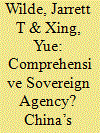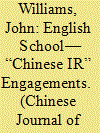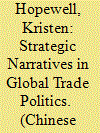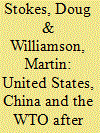|
|
|
Sort Order |
|
|
|
Items / Page
|
|
|
|
|
|
|
| Srl | Item |
| 1 |
ID:
177073


|
|
|
|
|
| Summary/Abstract |
This article investigates the confluence of China’s rise and International Recognition Theory through a quantitative content analysis of 166 joint statements on state visits between China’s heads of state and the representatives of 80 partners. China’s partnership diplomacy is a continuous, comprehensive, and dynamic diplomatic strategy for the 21st century. Yet, extraordinarily little research has explored the substance of China’s partnerships and the international experience that they offer. To investigate these dimensions, this article develops a typology of international recognition within which to situate China’s partnership diplomacy. We find that partnership documents exhibit a gradation of sovereign recognition that is transformed into “Comprehensive Sovereign Agency”: a type of sovereignty with Chinese characteristics that establishes the agency of the Chinese government over the comprehensive spectrum of China’s foreign relations. In contrast to earlier international experiences that ground sovereign agency in the functions of security, China’s partnership diplomacy yields a network that emphasizes the productive (economic, scientific, and cultural) functions of state capacity and international interaction. China’s partnership diplomacy reproduces the bilateral relations of preference and solidarity that ground China’s regime legitimacy in economic development. Its partnerships operate outside of the liberal multilateral security communities that generate international affinity through a difference-blind multilateral framework, constituting instead a difference-sensitive bilateral framework that provides a source of international recognition and sovereign agency that circumvent the liberal international experience.
|
|
|
|
|
|
|
|
|
|
|
|
|
|
|
|
| 2 |
ID:
177074


|
|
|
|
|
| Summary/Abstract |
This article addresses ongoing discussions across the English School (ES) of International Relations (IR) theory and IR theory drawing on Chinese philosophical traditions and Chinese history as exemplifying a “Global IR” approach. However, common interests in long-run history, non-material forms of power, and an international social structure have not yet led to sustained discussion of normative issues important to both approaches. Showing how analytical commonalities between ES and “Chinese” IR accounts of international societies and concepts of order and harmony focus on elite-level perspectives and priorities, I draw on critical and decolonial aspects of Global IR to argue for alternative accounts. Unexplored potential for this exists within the distinct methodological bases of ES and “Chinese IR,” opening space for normative engagement that can provide a model for other inter-tradition encounters in Global IR.
|
|
|
|
|
|
|
|
|
|
|
|
|
|
|
|
| 3 |
ID:
177070


|
|
|
|
|
| Summary/Abstract |
Most explanations for the crisis of the liberal order revolve around geopolitics, globalization, economic resentment fueling new forms of populism and nationalism, and Western states following their interests away from liberal values and institutions of their creation. But international orders are produced and legitimated by both material and spiritual forces. The spirit in liberalism is moral progress defined by practices of humanity. If the Liberal International Order (LIO) is in decline, then perhaps we should consider its moral foundations. Section “Introduction” briefly introduces the question of international order, categorizes international relations theories according to the mixture of consent and coercion, and how legitimacy often refers not only to the existing order but a vision of progress. This is particularly true of the liberal international order. Section “International Order, Legitimacy, and Progress” turns to the liberal international order, progress, and the possible spiritual decline of the liberal international order. After briefly considering the liberal in international liberalism and the late 20th-century emergence of the liberal international order, I argue that one reason for its declining moral foundations is because of the pronounced individualism that resides at the heart of the contemporary international order. In other words, the sources of decline are not exogenous but rather part of liberalism. The Conclusion asks: what is next? The conjunction of the decline of the LIO and COVID-19 has complicated the debate about the future international order, and much of the conversation hinges on whether and how the United States can recover from its self-destructive tendencies and China’s intentions. But where is the spirit of moral progress and humanity in this discussion?
|
|
|
|
|
|
|
|
|
|
|
|
|
|
|
|
| 4 |
ID:
177072


|
|
|
|
|
| Summary/Abstract |
The characterization of the United States as a liberal hegemon seeking to uphold free-market capitalism against the illiberal state capitalism of China and other emerging powers has become commonplace, along with the attendant notion that American economic openness has been exploited by the unfair trade practices of other states. Given their dominance in US political discourse and role in shaping contemporary policy—including fuelling Trump’s trade wars and aggressive unilateral trade actions against all of the United States’ major trading partners, his attacks on the World Trade Organization, and talk of a “new Cold War” between the United States and China—these claims merit far greater scrutiny. In this article, I challenge the stark dichotomy frequently drawn between American “free-market capitalism” and the “state capitalism” of its emerging challengers, arguing that this forms part of a strategic narrative deployed for political purposes, including legitimating the United States’ use of aggressive trade policy measures. An examination of the American hegemon’s actual trade and industrial policies complicates this characterization. Despite presenting itself as a promoter and defender of free trade, I show that the unifying logic of US trade policy has always been the promotion of American economic interests: the United States has engaged in considerable state intervention and trade protectionism, both to shield vulnerable industries and support others to achieve and maintain their global dominance.
|
|
|
|
|
|
|
|
|
|
|
|
|
|
|
|
| 5 |
ID:
177071


|
|
|
|
|
| Summary/Abstract |
A hegemon can destroy its international regimes, but what happens when it does not possess the capacity to reconstitute a regime to its liking? Drawing on structural power theory, our article examines President Nixon’s historic attacks on the Bretton Woods international monetary regime to help illuminate President Trump’s attacks on the World Trade Organisation (WTO). In both cases regime destruction was driven to a large extent by a desire to contain rivals: Europe for Nixon, China for Trump. Drawing on original archival material, our case study analysis shows that while the United States possessed sufficient negative structural power to derail Bretton Woods, it lacked sufficient positive structural power to create the new monetary structure Nixon wanted. Trump faces a similar dilemma: he can block the WTO regime, but cannot necessarily replace it with one to the United States’ liking. China is too powerful and possesses too much structural power of its own to give up its WTO privileges without a fight. After the Coronavirus pandemic, it is unlikely that China can prevent the United States from wrecking the WTO trade regime, but very likely it can block US attempts to create a successor regime tailored exclusively to US requirements.
|
|
|
|
|
|
|
|
|
|
|
|
|
|
|
|
|
|
|
|
|